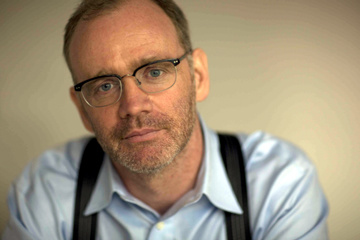
Martin Roper is originally from Dublin, Ireland and now resides as a writer in Brooklyn, NY. He earned his MFA in 1998 from the University of Iowa's Nonfiction Writing Program and began the UI Irish Writing Program in 1997. The Irish Writing Program, now in its 19th year, is a rigorous creative writing program requiring some talent, and especially commitment and discipline. Its goal is to help aspiring writers become better at their craft. University of Iowa students and non-UI students are welcome to apply to the program.
We sent these questions to Martin to learn more about the origins of this unique program.
What gave you the idea to start the Irish Writing Program at the University of Iowa?
The program wasn’t my idea. It was the idea of Emmett Vaughan, the then Dean of Continuing Education. I bumped into him in a fogged-in Cedar Rapids airport in 1996, by sheer chance. I didn’t even know the man. He suggested that I come up with a program connecting Iowa and Ireland. He gave me the freedom to create whatever program I liked and I’ll always be grateful to him for that. He was a dynamic force.
My idea was to create the best study abroad creative writing program in the world. That sounds immodest but that was the goal, and I think we do offer an outstanding study abroad experience. It’s an undergraduate program with graduate level expectations. My secret (out now) was to always treat undergraduate students as if they were graduates. They have always done the job. I knew that the University of Iowa was considered number one in America for the writers’ workshop, and I knew we in Ireland had exceptionally talented literature and drama professors. Bringing together the best of both places made the program an instant success. I think we combine the core of the American workshop model—one that is highly interactive for the student, with the best of the Irish approach to education— one that is inclined to be one-way (teacher talks and students listen) and rather formal.
Can you tell us a little about what students experience while on this program?
Students spend six weeks in Dublin, working with Irish writers and Irish academics. It was important to me that we created a program that was exclusively Irish so that students were immersed in an Irish sensibility— it’s very different from the American way of doing things. It’s more formal and less directed. Students study creative writing, Irish literature, and modern Irish drama. Guest poets, short story writers and novelists come in to the classroom every week for talks. We go to all the major theatres (and some of the fringe theatres) in Dublin. We spend one weekend away in Galway and visit the Cliffs of Moher and the Burren. We work non-stop. We are always reading and writing and talking ‘books’.
In our program students must attend all classes, and they must be on time. They also must complete all written work on schedule. There are no exceptions. This strict approach is a pleasant shock for some American students. They enjoy the discipline that it takes to stay the packed course for six long weeks. Learning ‘self-imposed discipline’ is key for the student writer, and one of my goals is to drill that fact into the students. There is a strong emphasis on listening, and on silence, and on presence. We aim to teach them the practice of ‘being’ a highly aware individual.

Walking trail along the Cliffs of Moher
What is the most fulfilling part of running a program like this?
The program's long success is a reward in itself. I only expected to do it for a single summer in 1997. The most fulfilling part of the program usually comes years later. I got an email last October from a student who was in the program seven years ago. His name is John Sherer. He gave his permission to quote from his note to me:
You may remember me from the ‘Irish Writing Program’ in 2007. So long ago, it seems. At the time, I was so young and unformed; writing was something I enjoyed, but I had no idea whether I wanted to pursue it seriously. The Dublin program was a kind of catalyst in my life; it confirmed for me not only that I had the basic abilities required, but that it made sense to think of writing as—dare I say it?—a vocation. The autumn after the program, I changed my major to English and decided to throw myself into writing. Thank you again for running such a great program. It is no exaggeration to say that it changed my life. I'm grateful for all your help and encouragement during that formative summer.
The program is a catalyst for the serious young writer. I get a lot of emails like that, years later. It tells me all of us in Dublin are doing a good job.
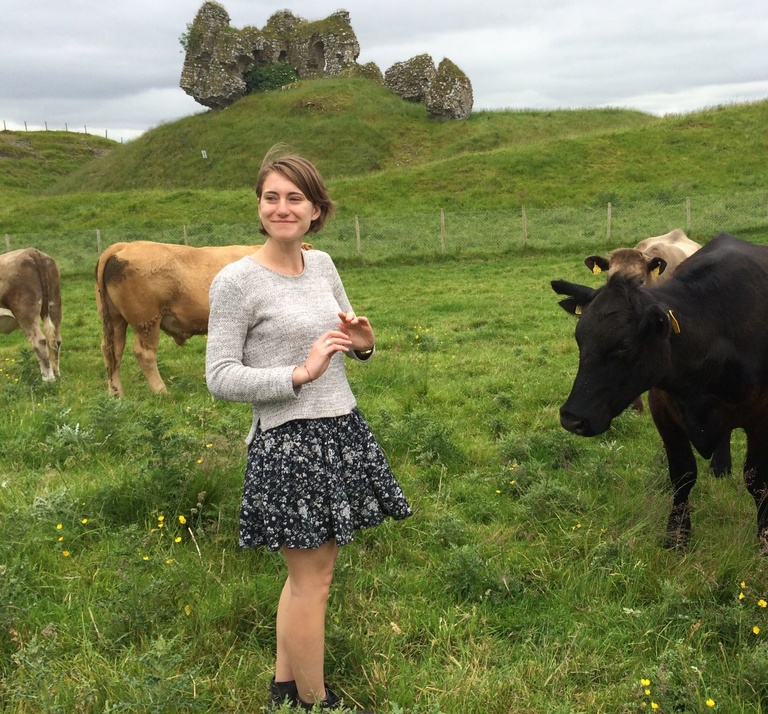
2014 participant Lauren Kessler exploring the Irish countryside
Over the years, I’ve had parents contact me to thank me for the transformation that occurred when adult children returned to the States. I take all the credit for any positive change in students.
Our program is often the first time a student has had the time to think seriously about their writing life. The student is in the company of others who are obsessed with the art of writing, as well. It’s an intense and exclusive group, and that intensity is deepened by the fact that they are not in America. These young writers are struggling together in a foreign country. They are getting lost on public transport together, they are struggling to learn to use the euro instead of the dollar, they are churning out raw work at great speed and being both courageous and kind with each other. It’s a unique experience. Invariably, they ask the big question: Will I dedicate my life to writing? My job is to help them answer that question honestly.
The most rewarding aspect of the program at the end of a given summer is reading the student evaluations and knowing that we have made the students into betters readers and writers, and that many of them really do become ‘present’, something that is important and difficult for all of us to do in modern society. Presence is crucial for the artist and it’s the essence of our program.
Working for many years with Mary Morrissy and Tom Halpin and Darren Kelly and Gavin Kostick has been rewarding. These are all writers and academics at the top of their game and I’m grateful that they’ve chosen to work with us year after year.
How has it grown over the years?
We’ve brought in a huge number of people over the years. Seamus Heaney was a regular guest and friend of the program. We’ve brought in newspapers editors, and politicians and Gardaí (police officers) to talk to students. We’ve brought in world-famous novelists and Irish sporting heroes. We’ve sat in on round-table talks at government meetings in Stormont Castle in Northern Ireland. This year we are expanding the program to include a module on Irish history. We’re also going to study the role of the Irish language in modern Ireland. We’ve kept the numbers small (about 20 participants) for many years but we’ve decided we’re going to increase those numbers over the next few years. It will make for a more diverse program.
What’s unique about the program?
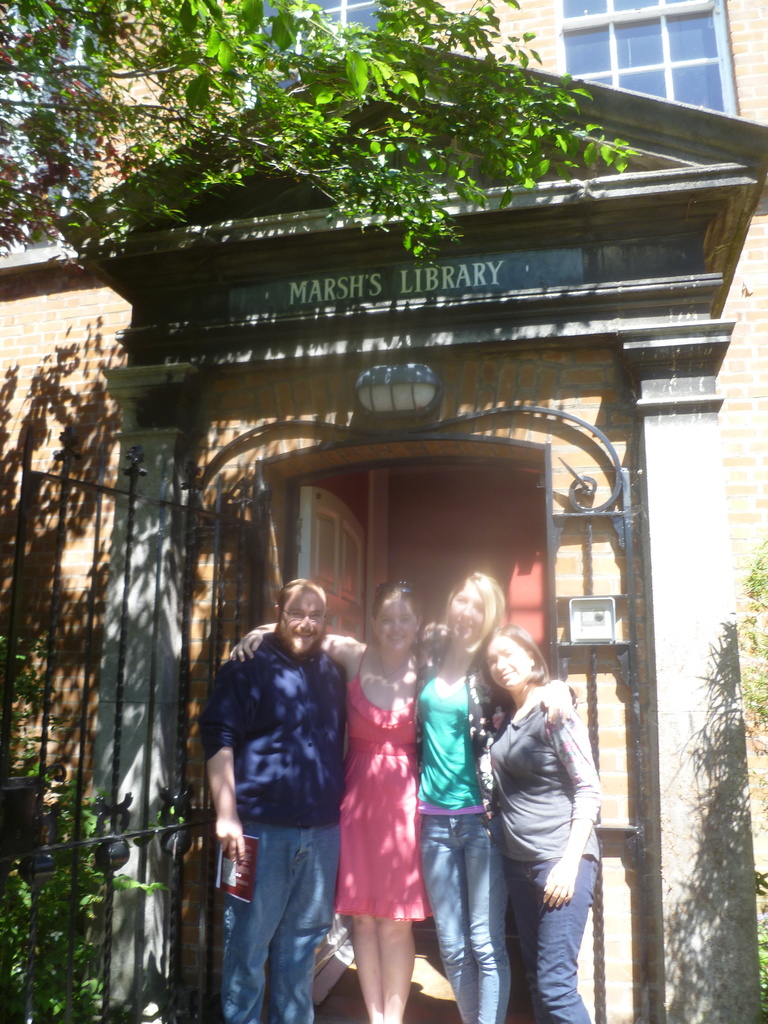
Paying a visit to Dublin's oldest library
All our teachers are Irish— that’s very important. Students spend over 110 contact hours in classes and at special events— that’s a huge number of hours for a six week summer program that is dedicated exclusively to writing. Remember, these students have to write every night, as well. And that’s important, too. Even though it’s a study abroad program and I’m aware they do need to get out and about to see the country (much to my chagrin I know most of the real learning happens outside the classroom and has nothing to do with me) it is important that they put in the hours in the classroom, and on their laptops, writing. They should feel the healthy weight of constant graft— and they do.
Something else that’s important about this program: it’s open to all students. They don’t have to be brilliant creative writing students— they just have to have a kernel of writing ability and be prepared to work hard. The work hard ethic is the important bit. I made that conscious decision in 1996. While it can be rewarding for a student to be surrounded by other great writing students, it can create what I call a stressful and negative ‘greenhouse’ effect. It can be stifling. It’s particular to writing, I think. Given the right set-up, writing students perform better in groups of varied abilities. After thirty years of teaching, this much I know for certain.
Finally, we don’t ‘correct’ students in our program. Many writers who teach ‘correct’ and ‘edit’ student work. It’s very common. This method is, I believe, detrimental to teacher and student. We teach the writers to correct and edit themselves. We teach them to discover themselves on the page. The hard (and thrilling) work is their job— and not their teachers’ job. Our program has a deceptively gentle classroom ambiance. We are without pretensions and completely open to all genres; but creatively we’re rigorous and demanding of the self. With freedom comes syntax.
What’s new about the program for 2015?
This year we are flying the Chinese writer Yiyun-Li to Dublin to give a reading and talk to our students. Yiyun Li moved from Beijing to live in the United States some years ago. She is a superb writer and she also has first-hand knowledge of studying abroad. This is a new and very exciting departure for our program. It promises to be a very special summer.
We plan to bring a writer of international standing to Dublin every year. The writer will be from a culture other than Ireland or the United States. The plan is to add diversity to our program for the students.
In what ways did your time as a student at Iowa influence your life post-graduation?
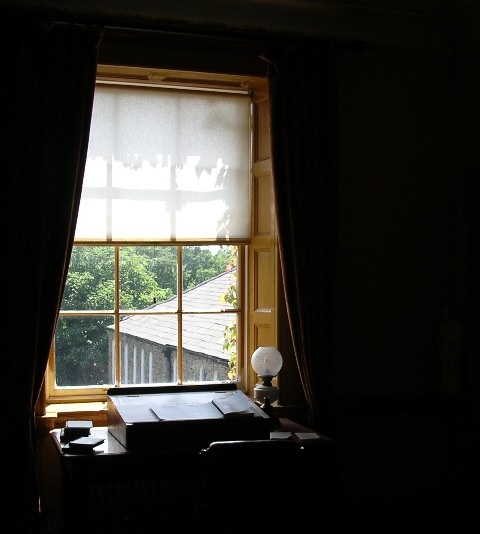
Gerard Manley Hopkins writing desk, Newman House, Dublin
I was a member of the International Writing Program at the UI in the Fall of 1994. Twenty years later I’m still coming back to Iowa every Fall for the Study Abroad Fair. I know Iowa as well as I know New York or Dublin. Iowa has a special place in my heart. Although I have no family in Iowa it always feels like home when I arrive every September. We always hold an information session in EPB, and, every year I have the same feeling when I walk into that building— I desperately wish I was going to class as a graduate student again. Being a graduate student at the UI was a wonderful experience. I didn’t want it to end.
I have been deeply influenced by Dr. Susan Lohafer who was a professor in the Nonfiction Writing Program and my thesis advisor. I thought I was a good teacher until I became her student. Dr. Lohafer taught me about the art of the essay. She taught me how to really ‘see’ language. Susan is the most important literary influence I have encountered in my life. She not only influenced me as a writer; she influenced me as a teacher. I aspire to be as good as she was. That’s impossible, of course, but the aspiration makes me a better teacher every time I walk into the classroom. When I encounter a difficulty in the classroom I think of her and somehow her manner— her wisdom comes through me and I persevere. It’s a visceral experience.
A literary agent read some of my essays while I was at Iowa and I turned those essays into a novel that was published by Henry Holt, and that book was excerpted in the New Yorker. That was life changing and Iowa played a role in that event. Being a graduate from Iowa mean your work gets taken seriously— at least the door is opened a crack for you. Those of us lucky enough to study at Iowa know the value of the Iowa connection.
What academic benefits do students on this program get that they might not from classes on campus?
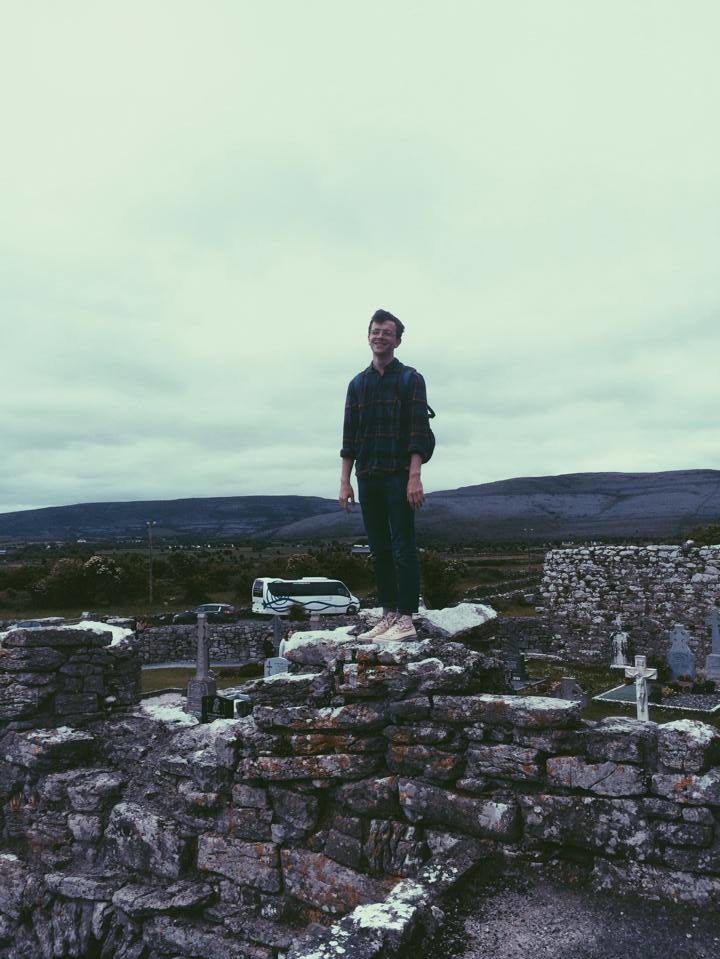
2014 participant Oliver Preston
They get a very ‘Irish’ education: Irish teachers; Irish attitudes. Without doubt, that’s the most invigorating benefit of this program. While Irish teachers are famous for taking no nonsense in the classroom, we’re also famous for joking. Humor is essential to survival in Irish society, and Dublin wit is notorious.
We also show students how our literature is deeply intertwined with our history and our politics. We literally show it to them on the streets: walking to the Abbey theatre they get to see the bullet scars on the GPO from the failed 1916 rising— an event recorded in the plays and novels we study. They get to see the places made famous in James Joyce’s Ulysses. They get to have lunch where Leopold Bloom had lunch.
Dublin is home to four Noble prize winners for literature (Shaw, Yeats, Beckett, and Heaney weren’t all born in Dublin but they all lived there for many years) and I make sure that we walk the streets that they walked. Bringing great Irish writer alive in this way is invaluable.
Students experience six weeks of intense focus on the English language. Language seeps into everything we do in Dublin. When we go to a play at the Abbey or Gate theatre I ask them not only to watch closely but to listen carefully. Rarely will a student have an opportunity to focus so intently on the language with a group of fellow writers, and do so in a foreign country in a demanding and attentive learning environment. Ireland becomes their classroom. The fact that they’re listening to English being spoken in a ‘foreign’ tongue helps them to sharpen the writerly ear. It’s a superb laboratory for them to study dialects.
Students tell me they are exposed to a large number of contemporary European writers in our program. The bookshops in Dublin are excellent and so students stumble across a lot of books they would not find so easily in the United States. This is especially true of books in translation.
Testing your mettle in another country is exhilarating. It’s hard work. Having ‘studied abroad’ looks good on a resume. I know this from experience. Some years ago I was asked to hire a slew of writing teachers for a university here in New York city. I always paid close attention to the job candidates who had studied or taught abroad. The reason? I knew they were likely to have been in situations where they had to be flexible and where they had to be survive in a challenging environment.
The program’s most valuable academic benefit? To be prepared for the world of work. To show students the benefit of working hard. That’s what I aim to do with our students—prepare them for the long, hard and rewarding road ahead.